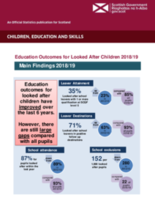Displaying 311 - 320 of 2221
The purpose of this study was to describe the stability of care histories from birth to age 18 for children in England using a national administrative social care dataset, the Children Looked After return (CLA).
The annual update on Education Outcomes for Looked After Children covering 2018-19 has been released by Scotland’s Chief Statistician.
This chapter provides an overview of one of the key factors implicated in young people’s contact with the criminal justice system: the criminalisation of children with care experience.
The present study uses concept mapping as an exploratory method, to identify themes that seem to be used by two groups of professionals in their judgement and decision making on reunification.
This study aimed to explore questions relating to caseworker’s training on ethnocultural diversity in connection with racial disparities and overrepresentation of Black children in child welfare services.
This study explored if domains of the Child and Adolescent Needs and Strengths assessment were associated with a prescribed trauma-focused treatment.
This paper reports the findings from a small qualitative study into child fosterage undertaken in Namibia in 2019.
This article presents the content concerning foster care as the tasks of the district government: the types of foster families, legal and organizational aspects of this form of care and the essence of the organization of foster care at county level are discussed.
This study reported comprises an evaluation of an Attachment-Centred Parenting (ACP) six session, evidence-based programme developed by the authors.
The purpose of this study was to inform states’ efforts to better design and implement extended foster care (EFC), examining the impact of the policy change on length of EFC stay and factors associated with youth’s time in EFC.

